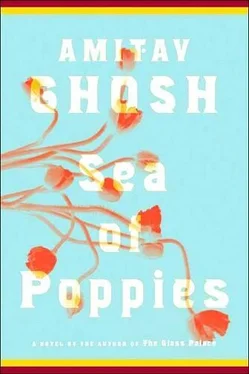abrawan (*The Glossary): 'The name of this finest of muslins comes, as Sir Henry notes, from the Persian for "flowing water".'
+achar: 'There are those who would gloss this as "pickle",' writes Neel, 'although that word is better applied to the definition than the thing defined.'
agil (*Roebuck [3] ): 'Many will raise their eyebrows when they learn that this was the lascar's equivalent of the English sailor's "fore" or "for'ard", just as peechilwas his equivalent for "aft". Why not, one might ask, agey and peechh ey , as would seem natural for most speakers of Hind.? Could it be that these essential nautical terms were borrowed from the languages of Cutch or Sind? Often have I asked but never been satisfactorily answered. But to this I can testify, in corroboration of the good Lieutenant's definition, that it is indisputably true that the Laskari terms are always agiland peechil,never agey-peechhey .'
alliballie muslin (*The Glossary): 'There are those, including Sir Henry, who would consider this a muslin of fine quality, but in the Raskhali wardrobe it was always relegated to one of the lower shelves.'
+almadia: An Arab riverboat of a sort that was rarely seen in India: Neel would have found it hard to account for its presence in the Oracle.
alzbel (*Roebuck): 'Thus does the ever-musical Laskari tongue render the watchman's cry of "All's well": how well I remember it…'
arkati (*The Barney-Book [4] ): 'This word, widely used by seamen to mean 'ship's pilot', is said to be derived from the erstwhile princely state of Arcot, near Madras, the Nawab of which was reputed to have in his employ all the pilots in the Bay of Bengal. Scholars will no doubt cavil at Neel's unquestioning acceptance of Barrère and Leland's derivation, but this entry is a good example of how, when forced to choose between a colourful and a reliable etymology, Neel always picked the former.
+atta/otta/otter: Such are the many English spellings for the common Indian word for 'wheat flour'. The first of these variants is the one anointed by the Oracle. But the last, which had the blessing of Barrère and Leland, was the one most favoured by Neel, and under his own roof, he would not allow the use of any other. The memory of this was passed along in the family even unto my own generation. Thus was I able recently to confound a pretentious pundit who was trying to persuade an unusually gullible audience that the phrase 'kneading the otter' was once a euphemism of the same sort as 'flaying the ferret' and 'skinning the eel'.
awari (*Roebuck): 'This, says Lt. Roe-buck, is the Laskari word for ship's wake. But as so often with the usages of the lascars, it has the oddly poetical connotation of being cast adrift upon the waves.' Legend has it that some members of the family went to the movie Awara expecting a tale of shipwreck.
+ayah: Neel was contemptuous of those who identified this word with Indian nursemaids and nurseries. In his home he insisted on using its progenitors, the French 'aide' and the Portuguese 'aia'.
bachaw/bachao: This word should by rights have meant 'help!' being a direct borrowing of the common Hind. term. But Neel insisted that in English the word was only ever used ironically, as an expression of disbelief. For example: ' Puckroweda six-foot cockup? Oh, bachaw!'
backsee (*Roebuck): This was the Laskari substitute for the English 'aback': 'Another of the many words in the Indian shipboard lexicon, where a Portuguese term was preferred over the English.'
+ baksheesh/buckshish/buxees, etc.: 'Curious indeed that for this token of generosity Sir Henry was unable to find any English equivalent ("tip" being dismissed as slang) and could only provide French, German and Italian synonyms.' Neel's optimism about the future of this word was based on the fact of its having few competitors in the English language. He would have been surprised to find that both baksheeshand its South China synonym cumshawhad been smiled upon by the Oracle.
+balty/balti: On this commonest of Indian household objects – the bucket – Neel penned several lengthy chits. Already in his time the use of these containers had become so widespread that the memory of their foreign provenance (the word being a direct borrowing of the Portuguese 'balde') had been lost. 'This much is certain, that the balde, like so much else, was introduced into our lives by lascars. Yet the object for which they used the term was a "ship's bucket", a leather container bearing no resemblance to the metal vessels that are now spoken of by that name. But the balde could not have become ubiquitous if it were not replacing some older object that was already in common use. What then was the name of the container that people used for their daily bath before the las-cars gave them their baldes? What did they use for the cleaning of floors, for drawing water from wells, for watering their gardens? What was the object, now forgotten, that once discharged these functions?' Later, on his first trip to London, Neel went to visit a lascar boarding house in the East End. He wrote afterwards: 'Living twenty to a room, in the vilest conditions, the poor budmasheshave no other expedient but to cook their food in enormous baldes. Being, like so many lascars, good-hearted, hospitable fellows they invited me to partake of their simple supper and I did not hesitate to accept. The meal consisted of nothing more than rootiesserved with a stew that had long been bubbling in the balde: this was a gruel concocted from chicken-bones and tomatoes, and was served in a single giant tapori. It bore no resemblance to anything I had ever eaten in Hind. Yet it was not without savour and I could not forbear to ask where they had learnt to make it. They explained that it was Portuguese shipboard fare, commonly spoken of as galinha balde , which they proceeded to translate as "balti chicken". This did much, I must admit, to raise in my estimation the cuisine of Portugal.'
History has vindicated Neel's optimistic evaluation of this word's future, but it remains true that he had in no way foreseen that the word's citizenship in the English language would be based on its culinary prowess; nor would he have imagined that on finding entrance into the Oraclethis humblest of Portuguese objects would come to be defined as 'a style of cooking influenced by the cuisine of northern Pakistan'.
balwar (*Roebuck): 'Too close in sound to its synonym, "barber", to have any realistic chance of survival.'
bamba (*Roebuck): 'Why would anyone continue to use this Portuguese-derived term for an object which already has a simple and economical name in English: "pump"?'
banchoot/barnshoot/bahenchod/b'henchod etc (*The Glossary): In his treatment of this expression, Neel decisively parts company with his guru, Sir Henry, who gives this cluster of words short shrift, defining them merely as 'terms of abuse which we should hesitate to print if their odious meaning were not obscure "to the general." If it were known to the Englishmen who sometimes use the words, we believe there are few who would not shrink from such brutality'. But rare indeed was the European who shrank from mouthing this word: such was its popularity that Neel came to be convinced that 'it is one of the many delightful composite terms that have been formed by the pairing of Hind. and English elements. To prove this we need only break the word into its constituent parts: the first syllable "ban"/"barn" etc, is clearly a contraction of Hind. bahin , or sister. The second, variously spelled, is, in my opinion, a cognate of the English chute, with which it shares at least one aspect of its variegated meaning. Like many such words it derives, no doubt, from some ancient Indo-European root. It is curious to note that the word chuteno longer figures as a verb in English, as its cognates do in many Indian languages. But there is some evidence to suggest that it was once so used in English too: an example of this is the word chowder, clearly derived from the Hind. chodo/chodna etc. The word is said to be still widely in use in America, being employed chiefly as a noun, to refer to a kind of soup or pottage. Although I have not had the good fortune to partake of this dish, I am told that it is produced by a great deal of grinding and pounding, which would certainly be consonant with some aspects of the ancient meaning that is still preserved in the usage of this root in Hind.'
Читать дальше












